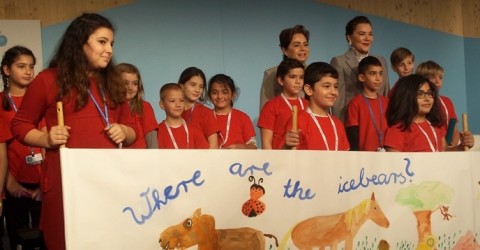
GCED Basic Search Form
Quick Search
Vous êtes ici
Nouvelles

The critical importance of education in international responses to climate change was the key message of “Education Day”, held at the UN climate conference (link is external) (COP23) in Bonn, Germany on 17 November 2017.
UNESCO, together with national, international and UN partners, held a series of side-events and discussion rounds all day, comprising a high-level panel discussion “Uniting for Climate Education – Further, Faster, Together through Partnerships”, co-organized with the United Nations Framework Convention on Climate Change (UNFCCC) and the COP Presidency, Fiji.
High-level governmental representatives and international organizations discussed how education and global partnerships can accelerate the implementation of the Paris Agreement on Climate and the Sustainable Development Goals (SDGs), and engage a critical mass of children, youth, professionals, decision-makers and wider society in climate action.
Need for education and strong partnerships to enable societal transformation
Speaking at the event, Mr Shyamal Majumdar, Head of the UNESCO-UNEVOC International Centre for Technical and Vocational Education and Training said: “Climate action needs more implementation, implementation needs education and skills.”
Ms Patricia Espinosa, Executive Secretary of UNFCCC, said: “I believe we stand at the edge of an incredible transformation - one with enormous economic opportunities. But transformations don’t happen in isolation. Education is key. And good education requires good partnerships.”
Her Royal Highness Princess Lalla Hasnaa of Morocco, President of Mohammed VI Foundation for Environmental Protection, said: “There is no need to dwell on the crucial role of education in order to rise to the climate challenge. However, what is of the utmost importance is to regularly pool and compare our approaches in order to enrich them.”
Mereseini Vuniwaqa, Minister for Women, Children and Poverty Alleviation, Fiji, called for long-term solutions: “We need to restore a respectful relationship with nature, and for this we need education. We need to get children out of the classrooms and see, understand and judge for themselves for needs to be done.”
Changing minds not the climate
Another side-event, co-organized with nine other UN Agencies, also explored how partnerships at all levels and in all sectors are key to boosting the contribution learning and skills make to climate change adaptation and mitigation It presented new types of partnerships that can help more actors, with examples coming from different sectors from all parts of the world.
One of the examples presented was the UNESCO Associated Schools Network (ASPnet) which mobilizes more than 11,000 schools around the world. The schools use UNESCO’s guidelines for “Getting climate-ready”, and develop partnerships with their communities. Jan Hendrik, a 14 year-old student of a German ASPnet school, said that international school exchanges were enablers for changing minds towards climate action: “I can now contribute to changing my school towards sustainable learning.”
Good practices show how education leads to climate action
During a press conference entitled “Good Practice in Action for Climate Empowerment”, organized by the Centre for Environmental Education (CEE), India, UNESCO and UNFCCC a compilation of case studies on climate change education for mitigation and adaptation in all parts of the world was launched. Representing UNESCO, Ms Julia Heiss, Team Leader on Education for Sustainable Development, said: “The case studies are an important proof and example of how education efforts lead to action which involves people in adapting and contributing to climate change mitigation. I hope they will inspire many more people and associations to follow a similar path.”
Throughout the day, short discussion rounds and presentations were held at the UNESCO Pavilion on a variety of subjects, including schools’ climate readiness, teacher education for climate change, youth leadership and greening technical and vocational education and training. These discussions were led by UNESCO, ASPnet schools, partners, experts, practitioners and youth representatives from around the world.
COP23 participants also visited UNESCO’s thematic booth on SDG 4 on quality education, co-organized with UNEP and UNITAR, to learn about the UN’s joint work in climate change education.
This year’s COP, which is taking place from 6 to 18 November, focuses on vulnerable nations and aims to develop a full set of guidelines to help government and non-government actors meet the goals of the Paris Agreement, to be finalized in 2018. The role of education and training in climate change was strongly emphasized at the Paris Climate Conference COP21 and again at COP22 in Marrakesh.
UNESCO promotes climate change through its Education for Sustainable Development (ESD) programme, and through the UNESCO Global Action Programme (GAP) on ESD, the follow-up to the UN Decade for ESD (2005-2014). UNESCO and partners seek to support countries to mainstream climate change into their education and training systems. Harnessing partnerships is one of the key strategies for the implementation of the GAP on ESD.
